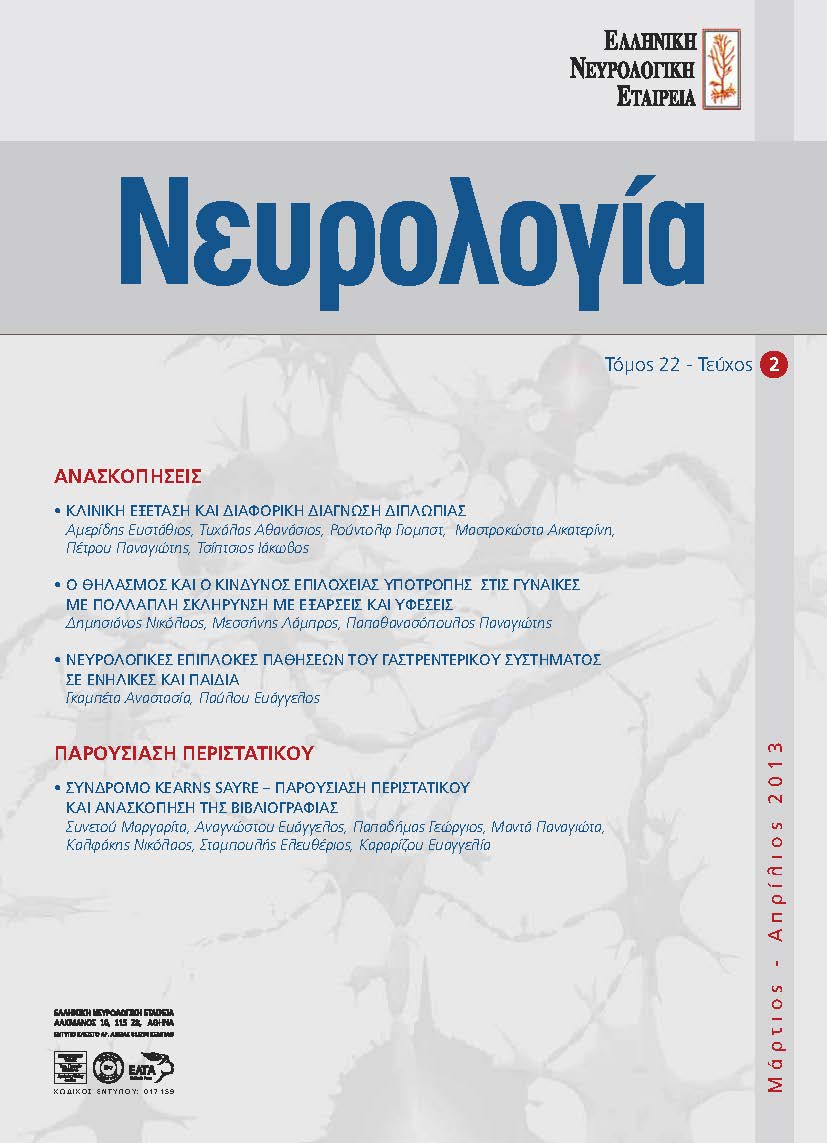Ο Θηλασμός και ο Κίνδυνος Επιλόχειας Υποτροπής στις Γυναίκες με Πολλαπλή Σκλήρυνση με Εξάρσεις και Υφέσεις
Λέξεις-κλειδιά:
Πολλαπλή σκλήρυνση, λοχεία, θηλασμός, υποτροπέςΠερίληψη
Η Πολλαπλή Σκλήρυνση (ΠΣ) είναι μια χρόνια, φλεγμονώδης νόσος του κεντρικού νευρικού συστήματος
(ΚΝΣ) που προσβάλλει περισσότερο γυναίκες της αναπαραγωγικής ηλικίας. Και ενώ η κύηση έχει αποδεδειγμένα προστατευτική δράση έναντι των υποτροπών της ΠΣ, κάτι τέτοιο δεν έχει αποδειχθεί για το θηλασμό. Στην παρούσα βραχεία ανασκόπηση γίνεται μια παρουσίαση και αξιολόγηση των μελετών που
εξέτασαν την επίδραση του θηλασμού στη δραστηριότητα της ΠΣ. Τα αποτελέσματα των μελετών που
εντοπίστηκαν παρέχουν αντικρουόμενα συμπεράσματα, καθώς υπήρχε μεγάλη ετερογένεια ως προς τον
υπό μελέτη πληθυσμό, τη μεθοδολογία, και μεροληψία ως προς την επιλογή των υπό εξέταση ασθενών.
Η συχνότητα των επιλόχειων υποτροπών φαίνεται να καθορίζεται κυρίως από τη δραστηριότητα της ΠΣ
πριν και κατά τη διάρκεια της κύησης. Γυναίκες με ενεργό νόσο πριν την εγκυμοσύνη (αυξημένη συχνότητα υποτροπών πριν και κατά τη διάρκεια της κύησης, αυξημένη EDSS κατά την έναρξη της κύησης) τείνουν να έχουν και αυξημένη συχνότητα επιλόχειων υποτροπών. Οι γυναίκες αυτές είναι, επομένως, περισσότερο πιθανό να αποφύγουν το θηλασμό προκειμένου να ξεκινήσουν νωρίς την προφυλακτική θεραπεία. Μέχρι να έχουμε μεγάλες, κατάλληλα σχεδιασμένες κλινικές μελέτες που να αποσαφηνίζουν το
ζήτημα, είναι ασφαλές να πούμε ότι ο θηλασμός πρέπει να ενθαρρύνεται σε γυναίκες με ΠΣ ήπιας μορφής, οι οποίες επιθυμούν να παρέχουν στο νεογνό τους τα ευεργετήματα του θηλασμού, πάντα υπό την
επίβλεψη και καθοδήγηση του θεράποντα ιατρού τους.


